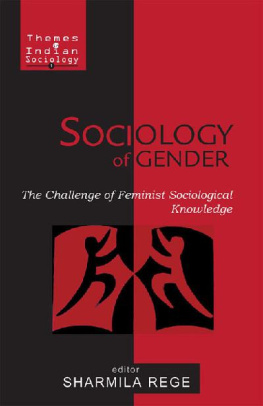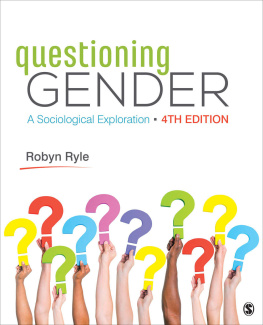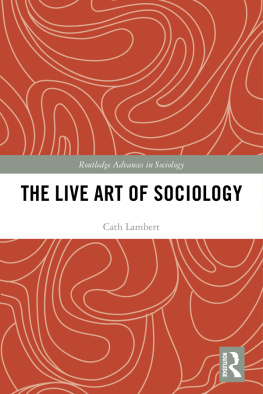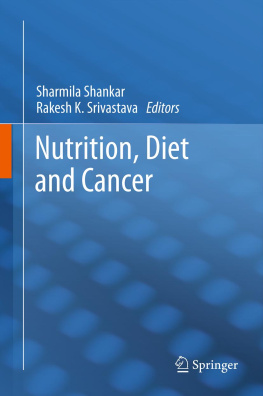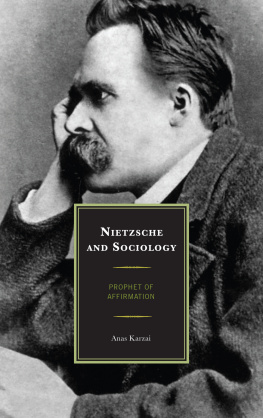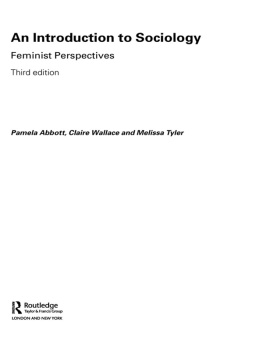S ociology of G ender
T hemes in I ndian S ociology
Series Editor: B.S. Baviskar
O ther B ooks in the S eries
Volume 2: Urbanization in India: Sociological Contributions
Editor: R. S. Sandhu
Volume 3: The Sociology of Religion in India
Editor: Rowena Robinson
Volume 4: The Indian Diaspora
Editor: N. Jayaram
Volume 5: Tribal Communities and Social Change
Editor: P. M. Chacko
Volume 6: The Family through Abstract and Lived Categories
Editor: Tulsi Patels
Volume 7: On Civil Society: Sociological Contributions
Editor: N. Jayaram
_________________________________________________________________________
T hemes in I ndian S ociology, Volume 1
_________________________________________________________________________
S ociology of G ender
T he challenge of F eminist
S ociological K nowledge
Editor
S harmila R ege
Foreword by
K aruna C hanana
Copyright Indian Sociological Society, 2003
All rights reserved. No part of this book may be reproduced or utilized in any form or by any means, electronic or mechanical, including photocopying, recording or by any information storage or retrieval system, without permission in writing from the publisher. References to Internet websites (URLs) were accurate at the time of writing. Neither the author nor SAGE is responsible for URLs that may have expired or changed since the manuscript was prepared.
First published in 2003 by
SAGE Publications India Pvt Ltd
B1/I-1 Mohan Cooperative Industrial Area
Mathura Road, New Delhi 110 044, India
www.sagepub.in
SAGE Publications Inc
2455 Teller Road
Thousand Oaks, California 91320, USA
SAGE Publications Ltd
1 Olivers Yard, 55 City Road
London EC1Y 1SP, United Kingdom
SAGE Publications Asia-Pacific Pte Ltd
3 Church Street
#10-04 Samsung Hub
Singapore 049483
Fourth Printing 2013
Published by VivekMehra for Sage Publications India Pvt Ltd, phototypeset by Krishtele Maging Solutions Pvt Ltd, Chennai in 10 pt Century Schoolbook and printed at Saurabh Printers Pvt Ltd.
Library of Congress Cataloging-in-Publication Data
Sociology of gender: the challenge of feminist sociological knowledge / editor,
Sharmila Rege; advisor, KarunaChanana.
p. cm.(Themes in Indian Sociology)
Includes bibliographical references and index.
1. WomenIndiaSocial conditions. 2. Sex roleIndia. 3. Feminist
theoryIndia. I. Rege, Sharmila. II. Series.
HQ1742S69 305.42'0954dc21 2003 2002155170
Sage Production Team: Amarjyoti Dutta, Radha Dev Raj and Santosh Rawat
Dedicated to the late
Professor G. S. Ghurye, Founder-President
of Indian Sociological Society
Thank you for choosing a SAGE product! If you have any comment, observation or feedback, I would like to personally hear from you.
Please write to me at
Vivek Mehra, Managing Director and CEO,
SAGE Publications India Pvt Ltd, New Delhi
Bulk Sales
SAGE India offers special discounts for purchase of books in bulk
We also make available special imprints and excerpts from our books on demand.
For orders and enquiries, write to us at
Marketing Department
SAGE Publications India Pvt Ltd
B1/I-1, Mohan Cooperative Industrial Area
Mathura Road, Post Bag 7
New Delhi 110044, India
E-mail us at marketing@sagepub.in
Get to know more about SAGE, be invited to SAGE events, get on our mailing list. Write today to marketing@sagepub.in
This book is also available as an e-book.
C ontents
Sharmila Rege
Beatrice Kachuck
Patricia Uberoi
G. N. Ramu
Leela Dube
Tiplut Nongbri
Homa Hoodfar
Raj Mohini Sethi
C. V. Kala
Pat Caplan
Karuna Chanana
Padma Velaskar
Maitrayee Chaudhuri
Judith Whitehead
Linda J. Epp
A summary of characteristics of respondents |
Means, standard deviations and differences between means for DEWs and DEHs on specific decision-making items |
Means, standard deviations and differences between means for SEWs and SEHs on specific decision-making items |
Occupations of husbands and wives |
Sources of financing migration |
Changes in female occupational pattern in Himachal Pradesh (rural) |
Proportion of cultivators and agricultural labourers to total workers in four districts of Himachal Pradesh (1981 Census) |
Size of the land-holding and average number of days worked by men and women in a year (rabi and kharif); |
District-wise distribution of respondents according to sex and the number of days of agricultural work done in a year (rabi and kharif) |
Distribution of respondents by sex and by the number of days of the work done in various aspects of cattle care |
Average number of hours per day per activity spent by women and men in cattle care |
Activities-wise distribution of average number of days in a year and average number of hours per day in domestic work |
Decision making by gender |
Sex-wise distribution of work |
Comparison of joiners and non-joiners on the basis of community |
Educational levels of joiners and non-joiners |
Comparison of husbands educational levels of joiners and non-joiners |
Comparison of husbands occupation of joiners and non-joiners |
Household composition of joiners and non-joiners |
The Indian Sociological Society (ISS) was established in December 1951 by Professor G. S. Ghurye and his colleagues in the Department of Sociology at the University of Bombay. The ISS soon launched its biannual journal, Sociological Bulletin , in March 1952. Since then the journal has appeared regularly for the last fifty years.
Started on a modest scale, each issue of the journal usually did not contain more than a 100 pages. During the initial years, the print order did not exceed a few hundred copies. The Bulletin has now matured into a respected professional journal both nationally and internationally. Since 1989 it is a fully refereed journal admired for its academic content and the high quality of its production. Very few professional associations in India and other developing countries have been able to achieve and sustain the kind of scholarly reputation acquired by the Sociological Bulletin .
The ISS celebrated its Golden Jubilee in 2001, and to mark the occasion it decided to publish a series of seven volumes, called Themes in Indian Sociology , based on articles published in the journal during the last five decades. When the proposal was placed before the Managing Committee of the ISS, it received wholehearted support and several colleagues came forward to help implement it. The 100 issues published during the period contained about 500 articles on a variety of subjects concerning society and culture in India and abroad. The authors list included almost all the leading names in Indian sociology and social anthropology. For the students of sociology and allied disciplines, it was a virtual goldmine of sociological knowledge. Some of the papers were considered landmarks in the development of the discipline and had acquired the status of classics in sociological literature.

